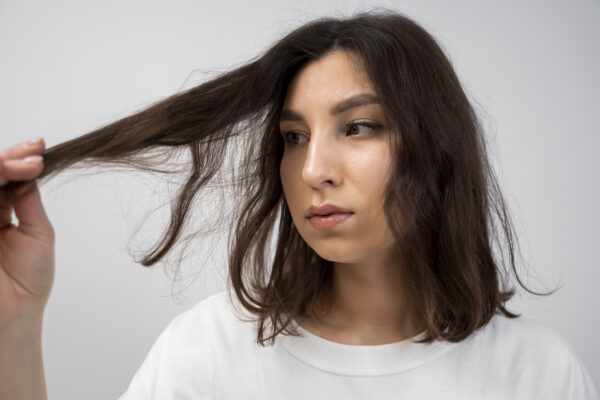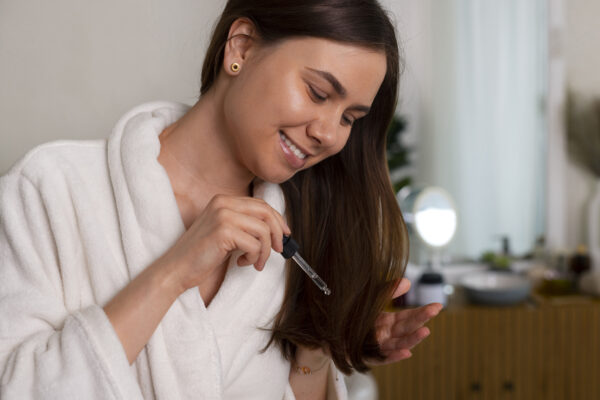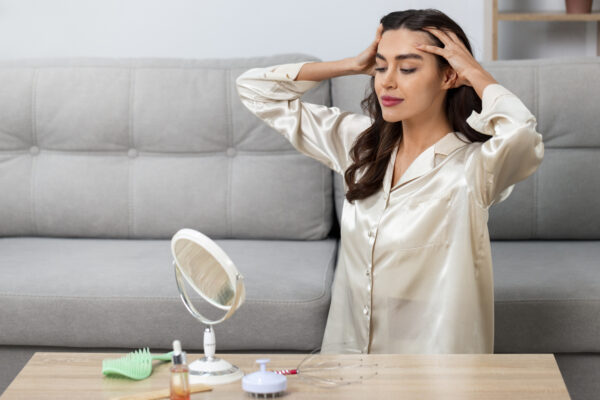
Dry, brittle hair can be a frustrating challenge, often leaving your locks looking dull and lifeless. Understanding the reasons for dry hair is the first step in restoring its natural luster. Here, we’ll explore effective strategies on how to get rid of dry hair, offering expert tips to rejuvenate and nourish your hair.
What causes dry hair?

Dry hair is a common problem that can be caused by a variety of factors. Understanding these causes can help you address the root of the issue and take appropriate steps to improve your hair’s health.
Dehydration
-
- Less water intake: When your body is dehydrated, it can affect all aspects of your health, including your hair.
-
- Reduced moisture: Dehydration can lead to a decrease in moisture production in your scalp, resulting in dry and brittle hair.
Overwashing
-
- Stripping natural oils: Washing your hair too frequently can remove the natural oils that moisturize your scalp and hair.
-
- Loss of protection: These oils act as a protective barrier, preventing moisture loss and damage.
Harsh Products
-
- Chemical damage: Shampoos and conditioners containing harsh chemicals, such as sulfates and parabens, can strip your hair of natural oils and damage the hair cuticle.
-
- Irritation: These chemicals can also irritate your scalp, leading to dryness, itchiness, and even dandruff.
Heat Styling
-
- Heat damage: Excessive use of hair dryers, curling irons, and flat irons can expose your hair to high temperatures, which can damage the hair cuticle and lead to dryness, brittleness, and split ends.
-
- Moisture loss: Heat styling can also cause your hair to lose moisture, leaving it dry and dull.
Environmental Factors
-
- Pollution: Exposure to pollutants in the air can damage your hair and scalp, leading to dryness and other hair problems.
-
- Sun exposure: Excessive sun exposure can dry out your hair and cause it to become brittle.
-
- Cold weather: Cold weather can also contribute to dry hair, as the cold air can strip your hair of moisture.
Signs of Hair Dryness

If you’re experiencing any of the symptoms mentioned below, these are the reasons for your dry hair.
Brittle Hair:
Your hair may break easily when brushing or styling.
Rough Texture:
Your hair may feel rough and coarse to the touch.
Lack of Shine:
Dry hair often appears dull and lifeless.
Frizz:
Your hair may be prone to frizz and static.
Split Ends:
Split ends are a common sign of dry hair.
How to Treat Dry Hair?

Many people struggle with dry hair, which can be caused by a combination of dehydration, overwashing, harsh chemicals, heat damage, and environmental conditions. Here are some ways on how you can prevent hair dryness.
Hydrate:
Drink plenty of water to keep your body and hair hydrated.
Gentle Cleansing:
Use a mild, sulfate-free shampoo and conditioner that is specifically designed for dry hair.
Limit Hot Water:
Wash your hair with lukewarm or cool water to help retain moisture.
Deep Conditioning:
Regularly deep condition your hair to replenish moisture and nourish your strands.
Air Dry:
Allow your hair to air dry whenever possible to avoid heat damage.
Protect from Heat:
If you are using any heat styling tools, apply a heat protectant spray beforehand.
Trim Regularly:
Get regular trims to remove split ends and promote healthy hair growth.
Avoid Overstyling:
Excessive styling can damage your hair, so try to keep it simple.
Use Natural Oils:
Coconut, argan, or olive oil can be used as a hair mask to moisturize and strengthen your hair.
How to Prevent Hair Dryness?

Preventing hair dryness begins with understanding the underlying reasons for dry hair. By adopting targeted care routines, you can effectively learn how to remove dryness from hair, keeping your locks hydrated and healthy. Here are some preventive measures you can take.
Protect from Sun Exposure
-
- The sun’s harmful UV rays can damage your hair, stripping it of moisture and causing dryness and brittleness.
-
- Wearing a hat or scarf can provide a physical barrier between your hair and the sun’s rays, helping to prevent damage.
Avoid Harsh Chemicals
-
- Hair color, bleach, and other harsh chemical treatments can weaken your hair and strip it of its natural oils, leading to dryness.
-
- If you use these products, try to minimize their frequency and choose products that are formulated for damaged or dry hair.
Eat a Healthy Diet
-
- Your hair’s health is influenced by your overall diet. Consuming a balanced diet rich in vitamins, minerals, and essential nutrients can help promote strong, healthy hair.
-
- Include foods that are high in protein, iron, zinc, biotin, and omega-3 fatty acids, as these nutrients are essential for hair growth and health.
Use a Silk Pillowcase
-
- Cotton pillowcases can cause friction and breakage, especially for those with curly or wavy hair.
-
- Silk pillowcases are smoother and less abrasive, helping to reduce friction and prevent damage to your hair.
Takeaway
Dry hair doesn’t have to be a constant struggle. By implementing the tips mentioned above, you can improve your hair’s health and appearance. Be patient, and give these methods time to show results. With a little effort, you can have healthy, hydrated, and beautiful hair.
Contact our hair experts today for personalized advice and recommendations.
FAQs around Dry Haircare Tips
1) How does heat styling impact hair health?
Heat styling can significantly damage hair health. Excessive heat from blow dryers, curling irons, and straighteners can strip the hair of its natural oils, leading to dryness, brittleness, and split ends. Over time, repeated heat exposure can weaken hair follicles, resulting in hair loss.
2) How can I restore my hair that’s damaged by hot blow drying?
To restore heat-damaged hair, it’s essential to reduce heat styling and provide extra care. Minimize the use of hot tools like blow dryers, curling irons, and straighteners. Deep condition your hair regularly with a hydrating mask to replenish moisture. Regular trims can remove damaged ends and promote healthy growth. Opt for gentle, sulfate-free hair products to avoid further damage. Finally, when you do style with heat, always use a heat protectant spray to shield your hair from excessive heat.
